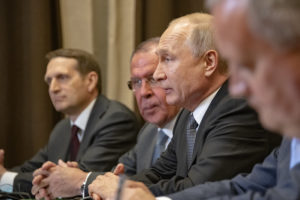
U.S. Secretary of State Michael R. Pompeo meets with Russian President Vladimir Putin in Sochi, Russia on May 14, 2019. [State Department photo by Ron Przysucha/ Public Domain]
Russian President Vladmir Putin announced a partial mobilization of Russian forces as Moscow’s army is losing ground in the seventh month of what was meant to be a three-day war in Ukraine.
Some 300,000 Russian reservists and men with previous military experience are expected to be called up to the ranks under a new decree which came into force on Wednesday, but it stops short of a full mobilization. The announcement came after a series of disastrous setbacks for Russia in eastern and southern Ukraine, where it has lost huge chunks of territory, equipment, and men. Putin finds himself caught between increasing pressure from Russia’s hawks in the security establishment, who have called for a full-scale mobilization, and fears that doing so could risk domestic political unrest.
Western officials long predicted that any Kremlin effort to mobilize more troops for the war would create backlash in Russia, and protests broke out after Putin’s announcement. Many of the Russian troops dispatched to Ukraine thus far have been drawn from poorer families and remote regions of the country. With high levels of draft evasion among wealthier families, calling up those with previous military experience enables the Kremlin to stave off mobilizing the sons of the urban elite—those most likely to spark a backlash against a war that the Russian public has largely supported.
Reuters reported sellouts in the sales of one-way plane tickets out of Russia, amid fears that the country’s border could be closed to men of fighting age. Traffic jams clog the border with Finland. Kremlin spokesman Dmitry Peskov was unable to provide an answer when asked if a travel ban would be imposed on those eligible for conscription. In St. Petersburg, crowds began to gather on the streets for the first time since the early days of the war, chanting “no mobilization,” while police chased away demonstrators in downtown Moscow.
The move to call up vast numbers of troops from civilian work comes after months of Kremlin denials about the potential of expanding the war effort. It is likely to deal a serious—if not fatal—blow to Putin’s effort to pitch the war as a “special operation” limited to Ukraine’s eastern Donbas region that has helped to shield the Kremlin from popular criticism. In the same speech, Putin also announced his support for the referendums this week in four Russian-occupied territories in Ukraine: Donetsk and Luhansk in the east, and Kherson and Zaporizhzhia in the south. Voting is expected to begin Friday.
The hastily organized referendums have already been rejected by the international community—the U.S. ambassador to Ukraine decried the “sham” votes”—but Russian analysts warned that Putin may seek to claim that any Ukrainian offensives in the region are a direct attack on Russian territory as a pretext to escalate.
If you’re willing to fight for Main Street America, click here to sign up for the Richardcyoung.com free weekly email.




